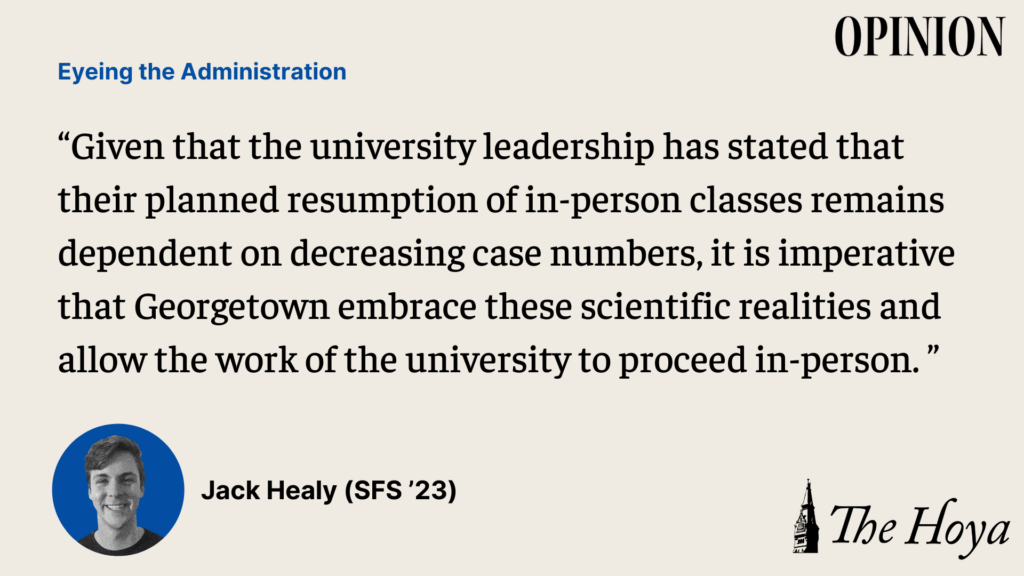Last month before Christmas, with COVID-19 cases of the omicron variant soaring, Brown University announced it would not make any significant changes to university operations, citing the effectiveness of vaccinations and boosters in meeting the university’s primary goal of preventing serious illness. Brown students will begin their Spring Semester as planned by joining their professors in the classroom with study spaces, student lounges, dining halls and fitness centers open for regular use.
Brown’s response was an outlier from the reactions of other private universities planning to suspend in-person instruction, including Georgetown’s announcement at the beginning of the semester, which gave students the holiday gift we are enjoying now: more Zoom classes, grab-and-go dining and no water in the library.
While a critique of the university’s financial motivations behind having students return to a nearly closed campus deserves its own column, President John J. DeGioia’s (CAS ’79 GRD ’95) follow-up explanation revealed the university remains more focused on transmission and case numbers than the efficacy of vaccines and boosters in preventing serious illness. Our understanding of the protection offered by vaccination, boosters, and natural immunity means now — yes, now — is a safe time to hold in-person classes, especially with a virus that is here to stay. With that remarkable protection, cases are no cause for constant alarm and repeated periods of virtual instruction with every campus spike. Given that the university leadership has stated that its planned resumption of in-person classes remains dependent on decreasing case numbers, it is imperative that Georgetown embrace these scientific realities and allow the work of the university to proceed in person.
Unfortunately, SARS-CoV-2 is here to stay, as physicians, public health experts and scientists like former Food and Drug Administration Commissioner Scott Gottlieb have written. Dr. Ashish Jha, dean of Brown University’s School of Public Health, has argued that nothing short of strict lockdowns will prevent a large spike in COVID-19 cases, and that even lockdowns would fail because the American public will no longer comply. Other scientists, like Dr. Vincent Racaniello and Dr. Daniel Griffin, co-hosts of a virology podcast that has been popular among physicians and scientists throughout the pandemic, have repeatedly discussed how getting to so-called “zero COVID” is no longer feasible. While it is not the reality most of us hoped for during much of the pandemic, COVID-19 is not going anywhere, and, given the high number of unvaccinated Americans and inevitability of future variants, future spikes are likely.
Luckily, we have vaccines, which continue to prove remarkably effective against all SARS-CoV-2 variants at preventing severe disease, hospitalization and death. The high number of individuals who continue to die from COVID-19 here in the United States is heartbreaking, and the overwhelming majority of them remain among the unvaccinated. Despite the staggering case counts of recent weeks, those vaccinated against SARS-CoV-2 who contract the virus largely experience mild symptoms, if any, especially with the prevailing omicron variant.
Georgetown’s requirement for all students, faculty and staff to be vaccinated and boosted means our community is well-protected against severe illness when infected. The high number of students who have tested positive for SARS-CoV-2 in recent weeks with moderate to no symptoms is further evidence of that protection, also demonstrating infected Georgetown students are not adding to any burden on local hospitals in the Washington, D.C. area.
The miracle of vaccines does not eliminate all risk and concern for individuals with complicating health factors or those who are immunocompromised. The university can and should continue to take steps to reduce risks to these individuals’ health and wellbeing, including making professional or academic accommodations as appropriate. Additionally, every community member should limit their exposure with testing and appropriate quarantining.
If the University continues to subject classes to the whims of case numbers, what is to keep Georgetown from continuing remote instruction if cases do not decline as expected, or in the event of future spikes? As Dr. Ranit Mishori (MED ’02), vice president and chief public health officer at Georgetown, said in her response to a photograph of her at a Kennedy Center conference as the omicron wave began, we have to learn to live with the virus. I agree with Dr. Mishori, but the life of the university includes in-person learning — something vaccines and testing make possible.
Jack Healy is a junior in the School of Foreign Service. Eyeing the Administration is published every other week.










Bill Clinton • Jan 26, 2022 at 10:53 am
Truly a remarkable piece. Jack Healy is a visionary of our time.
Peggy Heffernan • Jan 21, 2022 at 6:11 pm
Well written and spot on.
Gerard Fritz • Jan 21, 2022 at 2:46 pm
Very thoughtful, well-written column. Since you wrote this, the CDC finally acknowledge that natural infection provides immunity and omicron wave over in South Africa (8 weeks). We’ll see if GU “follows the science”? You don’t want any discounts, you want campus open. If President DeGioia does not resume in-person learning, someone needs to get an assembly permit and stage a mass, peaceful demonstration demanding that campus open and a return to in-person classes. I will come (massless, of course). Enough is enough.